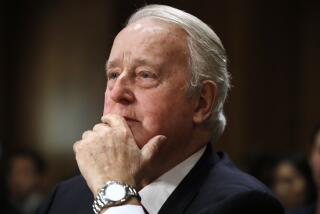Canadians Lose Faith in a Leader : Economy High, Mulroney Low
- Share via
OTTAWA — Prime Minister Brian Mulroney is proving to be that rarest of politicians; the better his record, the worse his standing with the people. If President Reagan is the Teflon man of politics because no trouble seems to stick, the metaphor for Mulroney has to be flypaper.
The latest public-opinion polls give his Progressive Conservative government only a 36% approval rating against 38% for the Liberal party and 24% for the socialist New Democratic Party.
Worse, only 45% of the people surveyed said they trusted Mulroney to represent Canada’s best interests in upcoming trade talks with the United States, the most explosive political issue currently facing the country.
All of this is in the face of Canada’s most impressive economic performance this decade, including creation of 450,000 new jobs, a nearly 2% reduction in the unemployment rate and an industrial growth rate last year that was twice that of the United States.
Mulroney can also take credit for reducing, if not ending, the divisive sectionalism that has traditionally plagued the country, while restoring good will with the United States after the uneasiness marking the last years of former Prime Minister Pierre Elliott Trudeau’s government.
Yet, in spite of these achievements, the first 16 months of Mulroney’s government are being rated a failure--and nearly all the blame is falling on the prime minister.
It wasn’t supposed to be this way. When Mulroney took office, he led the biggest parliamentary majority in Canada’s history. His personal popularity was unparalleled and his opposition was in such disarray that a conservative government seemed likely for the rest of the century.
But from the beginning, things went wrong for the prime minister. Although he projected the image of a strong, confident and well-organized leader during the 1984 election campaign, his government was quickly mired in confusion, then blundered into scandal and panic.
He was ridiculed following his meeting with Reagan at Quebec City last March in the so-called “Shamrock Summit,” where he serenaded the American President with a rendition of “When Irish Eyes Are Smiling” and agreed to put off action on ending acid rain, a volatile concern in Canada.
He went into Parliament with a plan to reform the old-age pension program by lowering payments to the well-to-do elderly and transferring the money to poorer recipients. But when the opposition orchestrated a campaign against change, Mulroney waffled and then withdrew the measure, although his party held 211 of 282 seats.
His government was then put on the defensive and Mulroney has never regained control of events, at least in terms of controling the agenda.
He also appeared uncertain in his response to the voyage of a U.S. ice breaker through Arctic waters claimed by Canada--first saying there was no challenge to Canadian sovereignty, then reversing his stand amid a public uproar. Even his protests proved ineffective because the ice breaker plowed through.
Still, as late as a year ago Mulroney enjoyed 60% approval in the polls, although the government was losing ground on specific issues.
Then came the tuna flap of last September, when Mulroney’s government allowed the public sale of fish that inspectors found unfit for human consumption. After much muddling, the prime minister recalled the tuna but was caught up in charges of a cover-up.
One of his Cabinet ministers resigned in the wake of the controversy, a particularly damaging event in a parliamentary government. Altogether, four people from Mulroney’s 40-member Cabinet have resigned, two in scandal-related matters and one in protest over the government’s decision to allow an oil refinery to close in Montreal.
The resignations accompanied continued criticism that the Cabinet was disorganized and incompetent, further eroding public confidence in Mulroney’s leadership.
He wasn’t helped by his constant changes of behavior in Parliament. First he would act aggressively, sarcastically answering nearly all questions aimed at the government rather than letting his ministers respond. Then he would switch tactics, adopting a more placid profile, claiming all was in order and that there would be no more intragovernment confusion.
Then, almost invariably, this was followed by a miscalculation that set the government back on the defensive.
The latest example was a government attempt to sell the Canadian-based De Havilland Aircraft firm to Boeing Aircraft, the giant U.S. company. It blew up in a bitter parliamentary fight, critics charging that Mulroney was selling off the last vestiges of Canada’s aerospace industry.
Instead of pushing the issue through before Parliament recessed for Christmas and starting the New Year’s session with the De Havilland matter behind him, Mulroney suddenly gave in to demands for more hearings, thus ensuring that the opposition would dominate the reopening of Parliament with an issue that seriously troubled the public. It was not a performance that built trust in his ability or his feel for the public mood.
In fact, public doubt about Mulroney seems to center on a perception that he can’t be trusted, a reflection of old concerns about the questionable tactics he used to win the Conservative Party leadership. It is an unease that appears to be fueled, not erased, by Mulroney’s constant statements that he is a man of integrity.
“It sounds too much like (former President Richard) Nixon’s ‘I’m ot a crook’,” said Norman Snider, the author of a study of Mulroney’s election campaign.
Just as there is a contradiction between his drop in popularity and his economic achievements, Mulroney also seems to suffer from reactions to characteristics normally seen as strengths.
He is handsome, well-dressed, loaded with charisma and self-confidence. Yet, the polls as well as conversations with numerous ordinary citizens show that he is perceived as too smooth, even slick, as if a man whose pants are never wrinkled cannot be trusted.
Few modern politicians speak as well as Mulroney. Even in the daily shouting and baiting of Parliament, the prime minister talks in paragraphs, constructing complex sentences that would win medals from grammarians.
But as one political columnist wrote, Mulroney comes across as “unctuous,” more like a snake oil salesman than a statesman, an impression helped along by overdoing some otherwise forgiveable political devices.
For instance, in an interview with an American reporter, Mulroney grinned and spoke vividly about the last time they had met. The problem was the meeting had never happened. It was not a performance to create trust.
More to Read
Sign up for Essential California
The most important California stories and recommendations in your inbox every morning.
You may occasionally receive promotional content from the Los Angeles Times.













